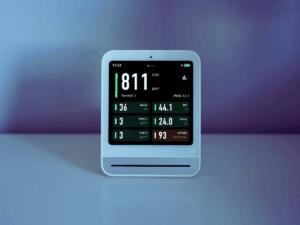![]() For many homeowners in Ft. Worth, dust seems to settle almost as soon as it’s wiped away. Sneezing, itchy eyes, sleep disruptions and lingering odors become part of daily life.
For many homeowners in Ft. Worth, dust seems to settle almost as soon as it’s wiped away. Sneezing, itchy eyes, sleep disruptions and lingering odors become part of daily life.
This article explains why Ft. Worth homes collect more dust and allergens than most, where they come from, and what you can do to improve the air in your home.
The Dust Problem in Ft. Worth Homes
North Texas is a dusty place by nature. The region’s dry air, high winds, and long stretches without rain lift fine soil particles into the air. When those winds pass over neighborhoods, highways, and construction zones, they blow that dust straight into your home.
Ft. Worth’s clay-heavy soil breaks down into tiny particles that stay suspended in the air longer than sand or loam. Combine that with nearby traffic and ongoing urban expansion, and it’s easy to see why homes across the Dallas–Ft. Worth area collect a thin layer of dust faster than you can grab a microfiber cloth. Seasonal pollen and agricultural dust from the surrounding plains only add to the mix.
Indoor Sources of Dust and Allergens
Even if you close every window, indoor sources continue to feed the problem.
Common contributors inside Ft. Worth homes include:
- Carpets and rugs trapping dust and pollen.
- Pet dander from dogs and cats.
- HVAC systems circulating unfiltered air.
- Dust mites thriving in warm, humid conditions.
Older homes often make this worse. Aging ductwork, poor insulation, and gaps around vents pull in attic dust and outdoor air. Once it’s inside, your HVAC system redistributes those particles through every room.
How HVAC Systems Spread Dust and Allergens
 Your HVAC system moves more than cool or warm air—it also moves everything floating in it. Each time the fan kicks on, it recirculates dust, pet dander, and microscopic debris. If your filters are clogged or your ducts leak, those particles bypass filtration and settle across your furniture, vents, and bedding.
Your HVAC system moves more than cool or warm air—it also moves everything floating in it. Each time the fan kicks on, it recirculates dust, pet dander, and microscopic debris. If your filters are clogged or your ducts leak, those particles bypass filtration and settle across your furniture, vents, and bedding.
Because Ft. Worth’s cooling season stretches from early spring through late fall, your air conditioning system runs for most of the year. That constant circulation keeps dust moving and can worsen allergy symptoms. Changing air filters often and cleaning ducts every few years can greatly improve indoor air quality.
Seasonal Allergy Triggers in Ft. Worth
Ft. Worth’s allergy seasons overlap, keeping pollen counts high almost year-round.
- Spring: Oak, ash, and elm trees fill the air with fine pollen.
- Summer: Grass pollen peaks and mixes with urban dust.
- Fall: Ragweed and mold spores thrive after rain.
- Winter: Closed windows and heating systems trap indoor allergens.
Warm, humid weather allows mold and mildew to grow in damp spaces, while dry spells raise airborne dust levels. Changing humidity levels throughout the year make managing allergens an ongoing task.
How to Reduce Dust and Allergen Levels in Your Home
You can’t control Ft. Worth’s climate, but you can limit what builds up inside your home.
Here are practical ways to reduce dust and allergens:
- Replace HVAC filters monthly or use HEPA-rated filters.
- Schedule professional duct cleaning and inspection.
- Use air purifiers in bedrooms and high-traffic areas.
- Seal duct leaks and upgrade to a high-efficiency HVAC system.
- Vacuum carpets and upholstery weekly with a HEPA vacuum.
- Keep humidity levels between 40–50% to discourage dust mites and mold.
Consistent cleaning, filter changes, and air quality tests help keep particles under control and improve the air you breathe.
When to Call an HVAC Professional
Sometimes the problem runs deeper than basic cleaning.
Call an HVAC technician if you notice:
- Visible dust around vents.
- Allergy symptoms that worsen indoors.
- Musty odors or mold near ducts.
- Uneven airflow between rooms.
A professional can inspect your system, test indoor air quality, and identify leaks or contamination you might not see.
Key Takeaways
- Ft. Worth’s dry winds, soil type, and long cooling season contribute to dust buildup.
- HVAC maintenance and air purification are your strongest defenses.
- Small habits like regular vacuuming, humidity control, and filter changes make a lasting impact.
FAQs
 Why is my Ft. Worth home so dusty even after cleaning?
Why is my Ft. Worth home so dusty even after cleaning?
The area’s dry winds and heavy HVAC use circulate fine dust through your home. Old ductwork or leaky vents can make it worse.
Can an air purifier really help with allergies?
Yes. A HEPA-rated air purifier can trap up to 99.97% of airborne allergens like dust mites, pollen, and pet dander.
How often should I replace my HVAC filter in Ft. Worth?
Every 30–60 days, especially during the long cooling season when your air conditioning system runs most of the time.
Breathe Easier. Live Cleaner.
Comfort Experts keeps your Ft. Worth home’s air clear of dust and allergens with professional HVAC care and air quality testing. Call the AC genius today to reclaim fresh, healthy air.
